Most think we’re at one of America’s most acrimonious times. After rereading David McCullough’s biography of John Adams, I was reminded of how contentious politics has always been.
Adams, a founding father, became our second president in 1796. Though “low-key,” his opponents condemned him, even his own Vice President, Thomas Jefferson. “Mrs. Adams may wash his befuddled brain clear,” one newspaper hoped on his last day in office.
Our politics were already bitter during George Washington’s second administration. Thomas Paine termed Washington a “hypocrite in public life” and the “American Caesar.” Washington declined a third term, exhausted by politics and criticism. He thought the country’s “party system” was bad.
After becoming President, Federalist Alexander Hamilton wanted Adams to be harder, back Britain, and go to war with France. Adams struck a peace pact with France because he thought the nascent nation should avoid war. Old “friends” like Jefferson accused him of seeking to make the Presidency a monarchy like the English King. Adams opposed it.
Then there were political “upstarts” who arrived from nowhere and had no government philosophy other than self-promotion. Adams hated them. Adams called Aaron Burr “this dexterous gentleman rise like a balloon, filled with uninflammable air.”(Remind you of any current politicians?)
Most political disagreements were couched in lofty concepts.
The “Anti-Federalists” (later called democratic “republicans”), who advocated strong state government but limited federal government, developed quickly. Fear that the commercial north would use federal authority to subjugate the rural (and slave-owning) south fueled that attitude.
These political breakdowns are surprisingly familiar today. The south and rural America still fear that the nasty federalists (now Democrats) from the north would force their “big-government” will on the “freedom-loving people” of the south (now predominantly Republican) and “never the twain shall meet.”
We could debate our county’s early politics all day. That’s why. Contentious politics will likely always be with us.
The American people have and must sort through politicians’ allegations and acrimony to find our system’s cohesiveness. Our democracy works because we love our nation and freedom under law, notwithstanding our disagreements.
Our history repeats itself, and as citizens, we must struggle to keep the system, however flawed, operating.
Stow’s Rolland Kidder.

